
"Mandy" is a popular song by Irving Berlin, published in 1919. [1] [2] [3]

"Mandy" is a popular song by Irving Berlin, published in 1919. [1] [2] [3]
"Mandy" was originally used for an Army-themed musical revue called Yip Yip Yaphank during World War I. For the number, soldiers in the show dressed in blackface and in drag. [4] This song and chorus line was also re-created for the 1942 play and the 1943 Warner Brothers film This Is The Army .
The number became a hit when it was re-used in the Ziegfeld Follies of 1919, where it was performed by Eddie Cantor, Van and Schenck and Marilyn Miller.
This song was performed by Eddie Cantor, Ethel Merman, Ann Sothern, George Murphy, The Nicholas Brothers, and The Goldwyn Girls in the 1934 film Kid Millions .
The song was revived in the 1954 movie White Christmas, where it was sung by Bing Crosby, Danny Kaye, and Rosemary Clooney. Crosby also recorded the song in 1954 [5] for use on his radio show and it was subsequently included in the box set The Bing Crosby CBS Radio Recordings (1954-56) issued by Mosaic Records (catalog MD7-245) in 2009. [6]

Irving Berlin was an American composer and songwriter. His music forms a large part of the Great American Songbook. Berlin received numerous honors including an Academy Award, a Grammy Award, and a Tony Award. He also received the Presidential Medal of Freedom from President Gerald R. Ford in 1977. Broadcast journalist Walter Cronkite stated he "helped write the story of this country, capturing the best of who we are and the dreams that shape our lives".
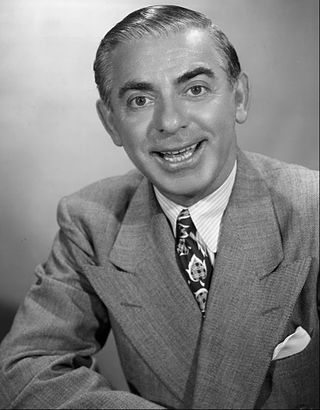
Eddie Cantor was an American comedian, actor, dancer, singer, songwriter, film producer, screenwriter and author. Cantor was one of the prominent entertainers of his era.

Yip Yip Yaphank is a 1918 musical revue by Irving Berlin. He wrote and produced the show during World War I, after he was drafted into the United States Army and was serving in 152nd Depot Brigade at Camp Upton in Yaphank, New York. The military revue was performed by the soldiers of Camp Upton. It moved to Broadway after a brief tryout at the camp.

Bert Kalmar was an American songwriter who was inducted into the Songwriters Hall of Fame in 1970. He was also a screenwriter.

Blue Skies is a 1946 American musical comedy film directed by Stuart Heisler and starring Bing Crosby, Fred Astaire, and Joan Caulfield. Based on a story by Irving Berlin, the film is about a dancer who loves a showgirl who loves a compulsive nightclub-opener who can't stay committed to anything in life for very long. Produced by Sol C. Siegel, Blue Skies was filmed in Technicolor and released by Paramount Pictures. The music, lyrics, and story were written by Irving Berlin, with most of the songs recycled from earlier works.
"There's No Business Like Show Business" is an Irving Berlin song, written for the 1946 musical Annie Get Your Gun and orchestrated by Ted Royal. The song, a slightly tongue-in-cheek salute to the glamour and excitement of a life in show business, is sung in the musical by members of Buffalo Bill's Wild West Show in an attempt to persuade Annie Oakley to join the production. It is reprised three times in the musical.
"Count Your Blessings (Instead of Sheep)" is a popular song written by Irving Berlin and used in the 1954 film White Christmas. It is commonly performed as a Christmas song, although the lyrics make no reference to the December holiday.

"Shine On, Harvest Moon" is a popular early-1900s song credited to the married vaudeville team Nora Bayes and Jack Norworth. It was one of a series of moon-related Tin Pan Alley songs of the era. The song was debuted by Bayes and Norworth in the Ziegfeld Follies of 1908 to great acclaim. It became a pop standard, and continues to be performed and recorded in the 21st century.
Harry Akst was an American songwriter, who started out his career as a pianist in vaudeville accompanying singers such as Nora Bayes, Frank Fay and Al Jolson.
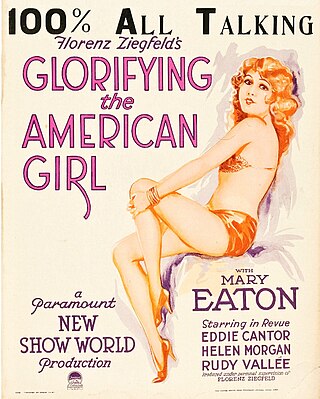
Glorifying the American Girl is a 1929 American pre-Code musical comedy film produced by Florenz Ziegfeld that highlights Ziegfeld Follies performers. The last third of the film, which was filmed in early Technicolor, is basically a Follies production, with appearances by Rudy Vallee, Helen Morgan, and Eddie Cantor.
Arthur James Johnston was an American composer, conductor, pianist and arranger.

"You'd Be Surprised" is a song written by Irving Berlin in 1919 which Eddie Cantor interpolated it into Ziegfeld's Follies of 1919. Cantor soon recorded it and it became a major hit. Other popular versions in 1920 were by the All-Star Trio and by Irving Kaufman.
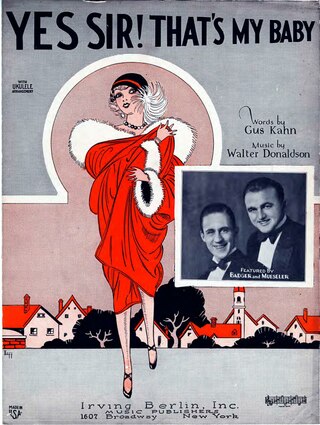
"Yes Sir, That's My Baby" is a popular U.S. song from 1925. The music was written by Walter Donaldson and the lyrics by Gus Kahn. It is now in the public domain.

Selections from Irving Berlin's White Christmas is an album with songs from the 1954 movie, White Christmas. Among the featured artists are Bing Crosby, Rosemary Clooney, Danny Kaye, and Trudy Stevens, with Peggy Lee, who was not in the movie, singing some parts. It is one of the last 78 rpm albums Decca produced.
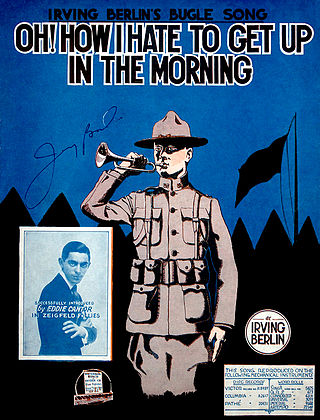
"Oh! How I Hate to Get Up in the Morning" is a song written by Irving Berlin in 1918 that gives a comic perspective on military life. Berlin composed the song as an expression of protest against the indignities of Army routine shortly after being drafted into the United States Army in 1918. The song soon made the rounds of camp and became popular with other soldiers, partly because hatred of reveille was universal.

The Brox Sisters were an American trio of singing sisters, enjoying their greatest popularity in the 1920s and early 1930s.

"I've Got My Captain Working for Me Now" is a popular song written in 1919 by Irving Berlin. It was published by Music Publishers Inc. in New York, New York.
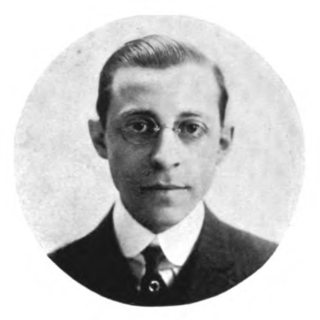
David Stamper was an American songwriter of the Tin Pan Alley and vaudeville eras, a contributor to twenty-one editions of the Ziegfeld Follies, writer for the Fox Film Corporation, and composer of more than one thousand songs, in spite of never learning to read or write traditional music notation. He may have written "Shine On Harvest Moon", a claim supported by vaudeville performer and writer Eddie Cantor. He was also a charter member of the American Society of Composers, Authors and Publishers or ASCAP.

"A Pretty Girl Is Like A Melody" is a popular song written by Irving Berlin in 1919 which became the theme song of the Ziegfeld Follies. The first verse and refrain are considered part of the Great American Songbook and are often covered as a jazz standard.
The Ziegfeld Follies of 1919 was a revue produced by Florenz Ziegfeld Jr. Billed as the thirteenth edition of the Ziegfeld Follies series, it had a tryout at Nixon's Apollo Theatre in Atlantic City, New Jersey, on June 10, 1919 and opened at Broadway's New Amsterdam Theatre on June 16, 1919 and closed on December 6, 1919. It is often considered to be the best and most successful of the Follies series produced by Ziegfeld.